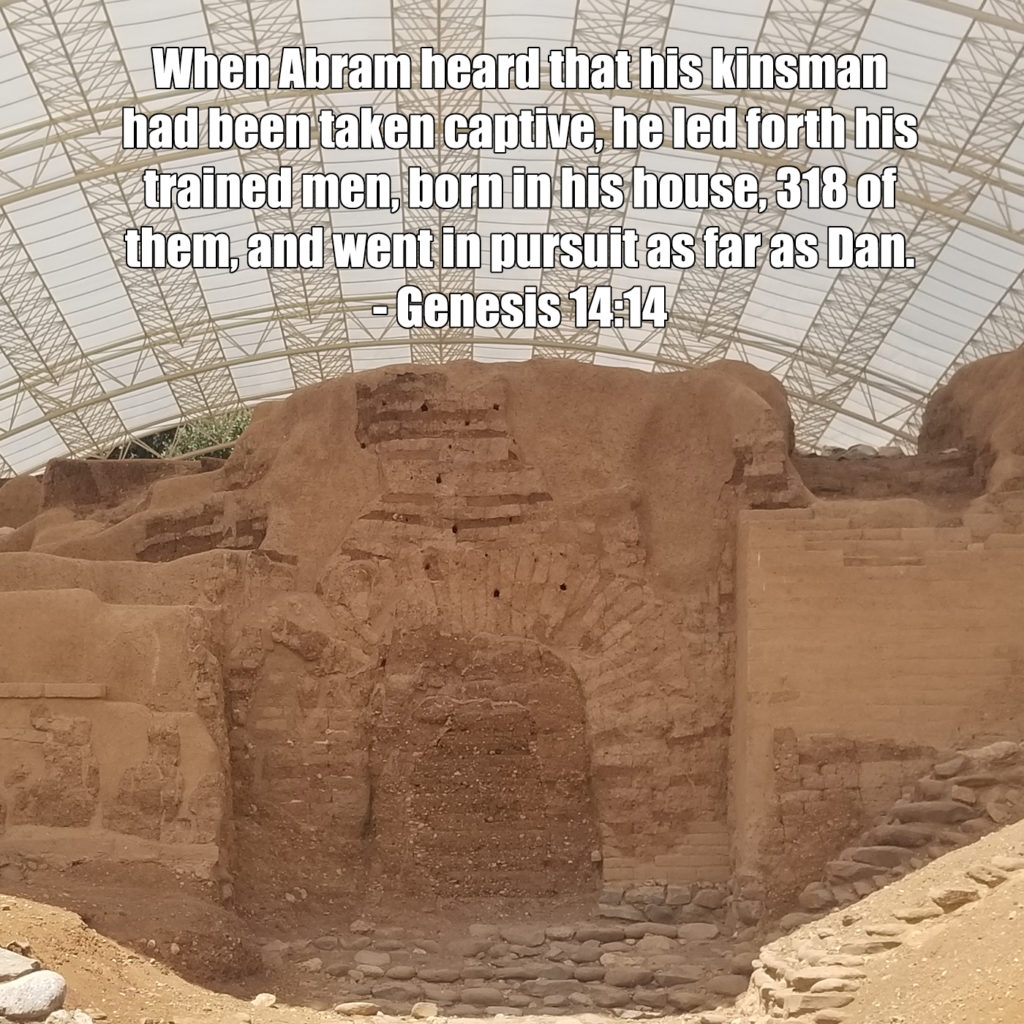
1 In the days of Amraphel king of Shinar, Arioch king of Ellasar, Chedorlaomer king of Elam, and Tidal king of Goiim, 2 these kings made war with Bera king of Sodom, Birsha king of Gomorrah, Shinab king of Admah, Shemeber king of Zeboiim, and the king of Bela (that is, Zoar). 3 And all these joined forces in the Valley of Siddim (that is, the Salt Sea).
At this point in Abram’s life the scripture records a great battle that happened in the region of Canaan. Four of the kings listed are rulers over large nations/empires: Shinar (Babylon), Ellasar (Assyria), Elam (a predecessor of Babylon and Persia), and Goiim (part of the Hittite Empire). These kings of nations are united against a force of five kings who rule over city-states all within the southern edge of the dead sea, the largest of which are Sodom and Gomorrah. The battle is actually waged along the shore of the Dead Sea (the Salt Sea). The five armies of the larger nations would have invaded from the north, staying close to fresh water.
4 Twelve years they had served Chedorlaomer, but in the thirteenth year they rebelled.
The reason for this battle is given. Apparently the kings of Sodom and Gomorrah, as well as the surrounding city-states used to pay tribute to Chedorlaomer, the king of Elam (a predecessor to Babylon and Persia), and then the decided to stop paying tribute, rebelling against his rule.
This suggests that Chedorlaomer was a great king, and perhaps also the leader of the other kings as well. This begs the questions as to why Sodom and the other cities rebelling was such a big deal, if Chedorlaomer lived so far away and had so much tribute. Sodom and Gomorrah and the other Canaanite cites, sit between Chedorlaomer’s empire in Mesopotamia, and Egypt. Simply put, by deciding to break alliances with Chedorlaomer, Sodom and Gamorrah basically cut off his trade with the Egyptian empire.
5 In the fourteenth year Chedorlaomer and the kings who were with him came and defeated the Rephaim in Ashteroth-karnaim, the Zuzim in Ham, the Emim in Shaveh-kiriathaim, 6 and the Horites in their hill country of Seir as far as El-paran on the border of the wilderness. 7 Then they turned back and came to En-mishpat (that is, Kadesh) and defeated all the country of the Amalekites, and also the Amorites who were dwelling in Hazazon-tamar.
Chedorlaomer begins his conquest of Canaan by attacking various Canaanite tribes. Interestingly enough, some of the tribes listed, including the Rephaim and the Amealekites, have been listed in scripture as tribes of giants. By attacking the giants first, Chedorlaomer is showing his strength and trying to frighten Sodom and the others into submission before the battle. Through this conquest they actually route around Sodom and Gomorrah, coming from Kadesh to the south instead of from the north, which would have been expected.
8 Then the king of Sodom, the king of Gomorrah, the king of Admah, the king of Zeboiim, and the king of Bela (that is, Zoar) went out, and they joined battle in the Valley of Siddim 9 with Chedorlaomer king of Elam, Tidal king of Goiim, Amraphel king of Shinar, and Arioch king of Ellasar, four kings against five.
The narrative comes full circle, returning to the battle at hand.
10 Now the Valley of Siddim was full of bitumen pits, and as the kings of Sodom and Gomorrah fled, some fell into them, and the rest fled to the hill country. 11 So the enemy took all the possessions of Sodom and Gomorrah, and all their provisions, and went their way.
The battle does not go well for Sodom and Gomorrah. At some point they decide to retreat, and many of their soldiers end up falling into tar pits, which are quite common in the area. The battle is quickly lost and Sodom, Gomorrah and the surrounding cites are all raided.
12 They also took Lot, the son of Abram’s brother, who was dwelling in Sodom, and his possessions, and went their way.
Now we see why this battle is being recorded in the first place. Lot, Abram’s nephew, is kidnapped, all of his possessions are taken away. It seems Lots previous decision to live near Sodom turned out the be a poor one.
13 Then one who had escaped came and told Abram the Hebrew, who was living by the oaks of Mamre the Amorite, brother of Eshcol and of Aner. These were allies of Abram.
Someone who know Lot, as well as Abram’s relation to him manages to escape and tell Abram about what ha happened. Abram has formed friendships and alliances with some of the local leaders of the Amorites. Mamre has apparently been a friend of Abram for years, as when Abram first came to Canaan he settled by the oaks of Mamre.
This is also the first mention of the word “Hebrew.” The word could mean “beyond” implying that Abram was a Foreigner living in Canaan, or it could be because Abram was descended from Eber.
14 When Abram heard that his kinsman had been taken captive, he led forth his trained men, born in his house, 318 of them, and went in pursuit as far as Dan. 15 And he divided his forces against them by night, he and his servants, and defeated them and pursued them to Hobah, north of Damascus. 16 Then he brought back all the possessions, and also brought back his kinsman Lot with his possessions, and the women and the people.
Abram does not hesitate but immediately takes 318 of this servants, who are trained to protect his wealth to battle. Most of these men are likely in their late teens and early twenties, as the phrase “born in his house” suggests that their parents also worked for Abram. With 318 trained men, Abram launches a surprise attack by night and overtakes the five armies, rescuing not only Lot, but many other citizens of Sodom and Gomorrah and the surrounding area. They chase Chedorlaomer and the other kings all the way to Dan, on the northern edge of Canaan. The gates he likely chased the army through can still be seen today (see above picture). He pursued them even further northward past Damascus, that capital of Assyria, which was quite literally enemy territory, as one of the four kings ruled over Assyria.
17 After his return from the defeat of Chedorlaomer and the kings who were with him, the king of Sodom went out to meet him at the Valley of Shaveh (that is, the King’s Valley).
For some unknown reason the king of Sodom was not among the prisoners, perhaps his predecessor had been killed in the battle, or perhaps he fled and left his citizens to be plundered. He meets with Abram who has returned with the citizens of Sodom, and much wealth and plunder. They meet in the Valley of Shaveh, near Salem (or Jerusalem).
18 And Melchizedek king of Salem brought out bread and wine. (He was priest of God Most High.) 19 And he blessed him and said,
“Blessed be Abram by God Most High,
Possessor of heaven and earth;
20 and blessed be God Most High,
who has delivered your enemies into your hand!”
And Abram gave him a tenth of everything.
The appearance of Melchizedek is odd, and is something New Testament writers often note. He is the king of Salem (Hebrew for “peace”) and his name means “king of righteousness.” He brings out bread and wine (the elements of communion) and gives a bless from God most high. The blessing states that God brought forth victory for Abram, which would be obvious considering the size of his force verses the size of his opponents’. Abram in response gives him a tithe from the spoils. This is the first mention of a tithe in Scripture, however it is only a one time payment, it does not reoccur on a regular basis.
What is more interesting is that Melchizedek worships the same God as Abram. At this point most people have turned away from God and have began worshiping pagan dieties. The fact that Melchizedek worships the true God means that he has not turned away.
Considering this, it is odd that there isn’t anything else known about Melchizedek, no genealogy, no other mentions of him in the text. It leaves many people wondering about who he was. While there are many theories, I personally think Melchizedek could possibly be Shem the son of Noah, noted for following the LORD, who, according to the genealogies, actually outlives Abram.
21 And the king of Sodom said to Abram, “Give me the persons, but take the goods for yourself.”
In dealing with the king of Sodom, Abram is made an offer, return the people but keep all the rest of the plunder. Now according to ancient customs this plunder was Abram’s by right. He had acted on his own, and had not been hired by anyone. However the king of Sodom makes a power play, suggesting that he had hired Abram to rescue the people, in a sense making Abram a mercenary. This is a public attempt to exert authority over Abram.
22 But Abram said to the king of Sodom, “I have lifted my hand to the LORD, God Most High, Possessor of heaven and earth, 23 that I would not take a thread or a sandal strap or anything that is yours, lest you should say, ‘I have made Abram rich.’ 24 I will take nothing but what the young men have eaten, and the share of the men who went with me. Let Aner, Eshcol, and Mamre take their share.”
Rather than be known as a mercenary, or be remembered as a servant to the king of Sodom, Abram makes known his true convictions. He had never sought to increase his possessions by his actions, he was not acting as a mercenary. He gives everything back to the king of Sodom, except for what was considered fair payment for his servants (who were paid by Abram) and the shares taken by Abrams allies.
Abram manages to turn the conversation around and by refusing the payment of the king and giving the king a reward that he didn’t deserve. In doing so Abram refused to be known as subservient to the king of Sodom, and may have even threatened the kings authority. However the king lets this slide, as he has just become a wealthy man. In a sense Abram made the king of Sodom rich.
Now Abram is going to not only be wealthy but also very well known, everyone in the area will have heard of Abram the Hebrew, blessed by God most High, who conquered the five kings and gave the spoils to the King of Sodom. He would become a legend in the land.
